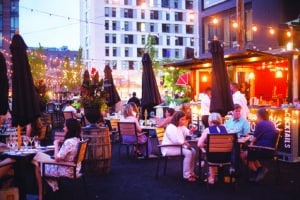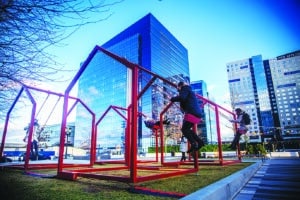
Seasonal outdoor dining options such as Il Giardino in Boston’s Seaport have become important elements of retail developers’ strategies and are likely to become permanent fixtures. Photo courtesy of WS Development
Like nearly all industries, the retail industry has weathered an unprecedented storm over the last year. While COVID brought about challenges beyond anticipation, it also accelerated trends that have quietly challenged industry norms for the past decade in a way that’s yielded some positive evolutions for the consumer and for the productivity of the store.
As the developer of neighborhood and community destinations including Boston’s Seaport, The Street Chestnut Hill, MarketStreet Lynnfield, Legacy Place and Derby Street Shops, here are some of the changes we have seen across the industry.
Historically, brands have sought out open air retail for its ease of access, diversified tenant mix, recession-resistant anchors and high visibility. While these characteristics remain true, the pandemic pulled into focus yet another criteria: properties that have allowed people to feel safe and as a result, maintained a strong level of activity.
During COVID, our outdoor retail properties have become many customer’s ‘other’ place – absent the traditional routine of work commutes – shoppers come for discovery, convenience and escape in a safe, open-air environment.
Retailers Make Nimble Pivots
Retailers increased their focus on customer service in a myriad of ways, and this new dynamic will have long–standing effects.
For example, shoppers at Evereve at Derby Street Shops, Carhartt at MarketStreet Lynnfield and Legacy Place, and lululemon at The Street Chestnut Hill, among other WS properties, enjoyed apps that gave clear communication about wait times and line cueing. The concept of Buy Online/By Phone and Pickup in Store was introduced, or expanded upon, at shops like Mejuri in Boston Seaport, allowing shoppers to find a new level of convenience.

Public art installations such as MiCasa is Your Casa augmented WS Development’s outdoor winter games and activities at its Boston Seaport portfolio. Photo courtesy of WS Development
Tailor-made experiences and VIP treatment were very popular, whether that was by- appointment shopping, virtual consultations, in-home fittings or complimentary home delivery, offered by shops like b8ta in Boston Seaport, and Legit Activewear at The Street Chestnut hill.
The way in which our retailers innovated and adapted to new modes of business is Herculean in scale. While some of these pivots were unique to the pandemic, retailers tuned into their audience and found new ways to repurpose their offerings or even their physical footprint, with remarkable creativity and resolve.
In the absence of nightlife, for example, The Grand, Seaport’s popular nightclub, created a local fitness partnership with Bounce & Groove classes on indoor trampolines. Women’s clothing boutique Evereve began offering subscription boxes that continue to prove extremely popular and that allow them to find a new way to meet the needs of their customer. Juice Press and Panera locations began offering fresh produce, and Rev’d Indoor Cycling shifted to outdoor rides and bodyweight strength classes.
Countless small businesses have recognized the power and importance of omni-channel experience. This change has allowed small businesses to move towards closing the gap between their models and direct-to-consumer brands as they broaden their audience and introduce new revenue streams.
From online booking, to curbside pickup, to contactless checkout to subscription services and beyond, retailers and restaurants alike have seen the benefit of reimagining their experience around the customer’s needs.
Pop-ups Augment Lease Ecosystem
WS has long found a place for retail incubation – the idea of creating opportunities for brands to test a concept, product or market while minimizing their outlay of risk.
During the pandemic these short-term leases proved even more integral to inserting additive uses, creating vibrancy and providing tenants with opportunities that can translate to longer-term successes. Last year, our properties hosted some of our most exciting pop-ups yet. These include Flour Bakery + Café (The Street and Legacy Place), Mill 77 (MarketStreet Lynnfield), Cattivo (Derby Street Shops), The Candy Shop (MarketStreet Lynnfield, this became a permanent tenant), Dove & Donkey (Boston Seaport, The Street); Injeanius (Boston Seaport), and Harvey Traveler (Boston Seaport).

Mark Roberts
WS has always been deeply committed to public art and community centric activations, but during the pandemic we have placed outdoor activations at a premium because we know that people are hungry for ways to safely connect and engage with one another and the outside world. These activations have ranged from the largest free fitness network in Boston, shop-to-table events and interaction art installations like Mi Casa Your Casa in Seaport.
Most recently, we brought a migrating flock of flamingos, ranging in size from 200 to 2,000, to Derby Street Shops, Boston Seaport, MarketStreet Lynnfield and The Street Chestnut Hill. These cheeky, iconic plastic pink lawn flamingos brought smiles to literally thousands of faces across Massachusetts.
Whether we are navigating the throes of COVID or taking a collective exhale that the end is in sight, making the customer smile has and always will be a priority to creating places people want to be.
Mark Roberts is executive vice president of leasing for WS Development.




 |
| 

